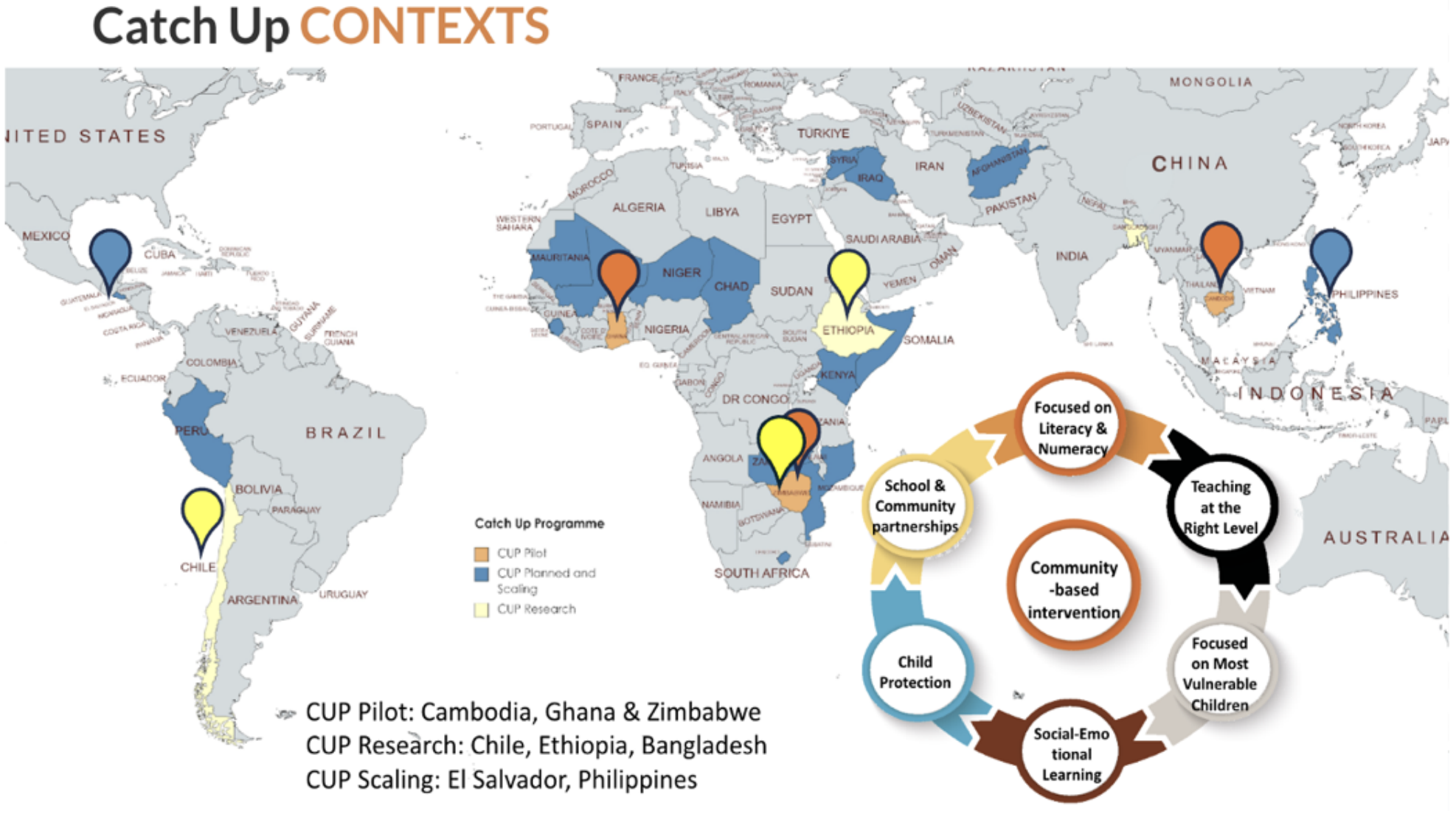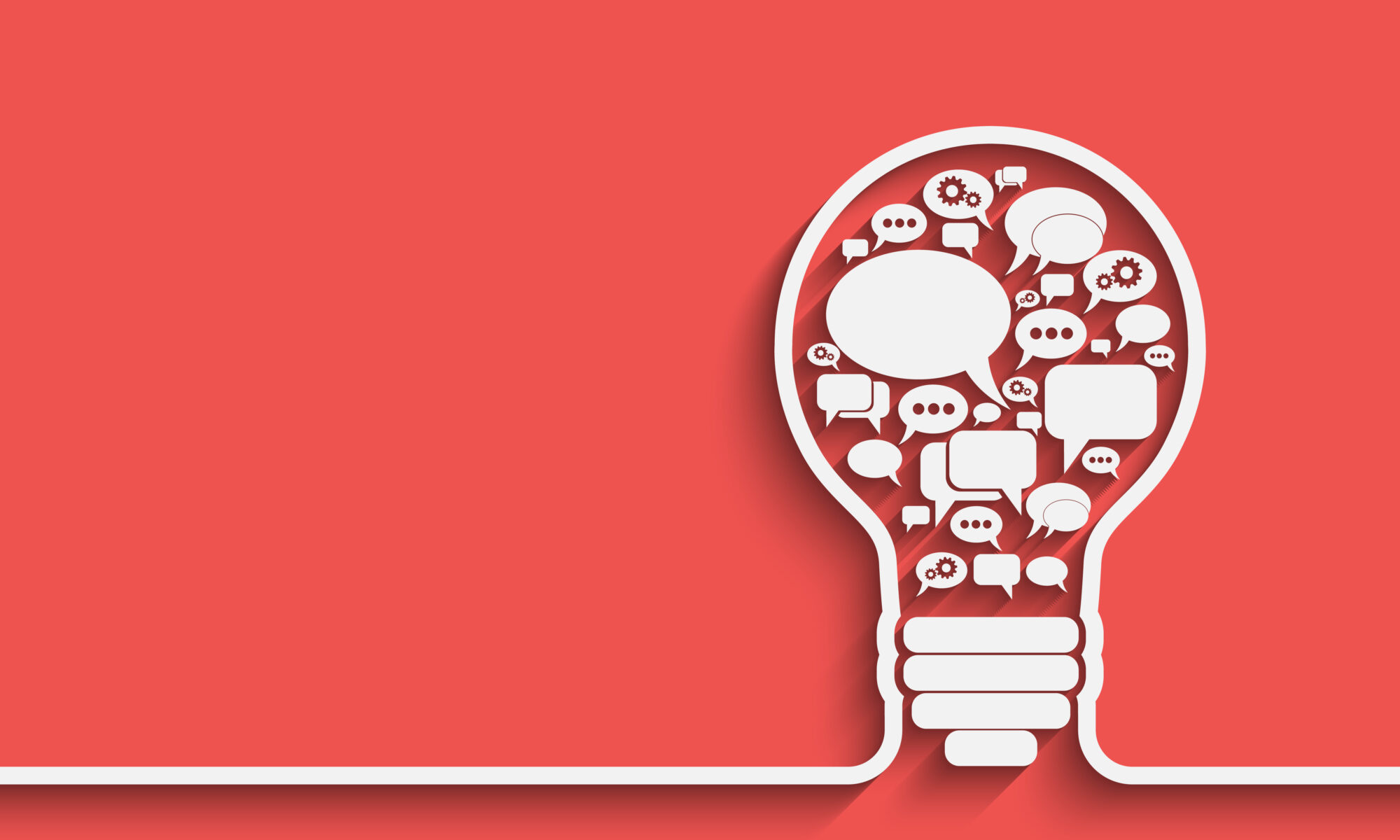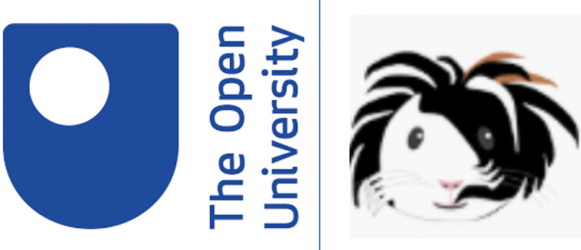Catch Up – foundational literacy, numeracy and social emotional learning skills
Principal Investigator: Dr Ale Okada (OU)
Co-Investigator: Dr Margaret Ebubedike (OU)
Implementing partner: World Vision
Focus countries: Chile, Ethiopia and Zimbabwe
Members: Dr Keetie Roelen (OU), Claire Hedges (OU)
Expert Advisors: Prof Kwame Akyeampong (OU), Prof Peter Gray (External)
Funders: USA-WV
World Vision initiated the Catch-Up Programme (CUP) in response to COVID-19 education disruption.
CUP focuses on the acquisition of early-grade foudational skills of vulnerable children aged 6-13 who have experienced educational disruption. This includes literacy, numeracy and social emotional learning. The program was developed to help them recover lost learning and return to education .
The programme is designed to provide safe, play-based, inclusive, enjoyable(fun) and carefully sequenced instruction at the right level that also addresses the SEL social emotional learning of children.
The three key actions of the CUP project are:
- Mobilizes communities to support children’s learning.
- Supports the well-being of community facilitators.
- Forges partnerships with schools and teachers to provide holistic support.
The Open University is conducting mixed-methods research to evaluate the implementation, effectiveness, relevance, and adaptation of the program in Chile (humanitarian setting), Ethiopia (conflict setting), and Zimbabwe (development setting). The research aims to identify strengths, challenges, and opportunities to improve learning experiences and outcomes for these children.
Our Research Objectives are:
- Design, support, implement, and validate SELIC (Social Emotional Learning in Context) to ensure relevance and effectiveness
- Strengthen evidence of CUP’s effectiveness and adaptability for children’s recovery learning in diverse, low-tech, crisis-affected contexts.
- Develop and share proof-of-concept outputs—policy briefs, mobile resources, and reports—to support programme visibility, scaling, and sustainability.
- Advance participatory, action-oriented research for continuous improvement through webinars, online briefs, and offline digital resources.

The evaluation methodology, underpinned by equity, diversity, and inclusion, using open educational resources (slides, videos, tools), open research (evaluation articles, research briefs), and open science (evaluation data wih open access ).
Responsible Research and Innovation aims to strengthen evidence for CUP in real-world implementation contexts for further adaptations and scale.
Dr. Okada and her team also developed a new Social Emotional Learning (SEL) Instrument. The SEL self-reflective instrument was designed for children to reflect on their educational experiences supported by social emotional learning.
“CUP is helping to bridge the gap in learning created by COVID” Headteacher in Zimbabwe
Some considerations and recommendations to strengthen the outcomes and sustainability of the CUP programme include:
- Retention and support strategies, particularly for volunteers.
- Targeting the most vulnerable children.
- Using an integrated approach to literacy teaching and learning.
- Making sufficient time for CUP learning.
- Parental engagement and learning beyond the school.
The Open University will support World Vision through mixed-methods research to explore the effectiveness, relevance and adaptation of the CUP programme.
Findings
For further details, please see Research Brief: Catch Up Learning Programme in Zimbabwe.
The Open University, through mixed-methods research, has further explored the effectiveness, relevance and adaptation of the CUP programme in Chile, Ethiopia and Zimbabwe.
The key findings are:
- Reach: In all three contexts, CUP was able to reach children in the target groups; however, stakeholders in all settings point to unmet demand.
- Learning Gains: In all three contexts, most children (70% or more) are learning within a 16-20 week learning cycle.
- Social Emotional Learning: Its integration into CUP sessions not only fosters learning progress but also addresses the broader psychosocial needs of the learners.
- Shared Ownership: High levels of collaboration between educators, communities, education officials and policymakers are key to CUP’s successes.
- Adaptations and Design Choices: Significant adaptations were made in different aspects of the program at national and local level to respond to very different contexts.
The following key challenges and further questions were identified:
- Sufficiency: To look at if the learning time given and learning gains seen are sufficient to enable children to progress in regular classes and complete primary school.
- Those Not Yet Learning: To undertake a study focussed on these children to find out more about who they are and their challenges.
- Resistance of School Systems: If long-term change is to be achieved, schools themselves need to change, and how CUP can influence this.
- Scalability and Sustainability: Facilitator turnover, funding and regular training support for facilitators and schools are ongoing challenges.
- Evidence Generation: Embedding systematic data collection across the learning cycles is challenging in often volatile operating environments.
Discover more about Open University Research about Catch-up project
Discover more about World Vision Catch-up Programme
Our Partners from World Vision:
Janelle Zwier (janelle_zwier@wvi.org)
Blessing Mukandakand (Zimbabwe)
Richard Chokera (Zimbabwe)
Mesfin Jonfa (Ethiopia)
These are explored further in:
- Policy Brief (2025):Inspiring foundational learning for all children – A call for action.
- Summative Report: Okada, Alexandra; Ebubedike, Margaret; Hedges, Claire and Zwier, Janelle (2025). Catch Up Education Research Report: Foundational Literacy, Numeracy, and Social Emotional Learning Skills in Vulnerable, Conflict, and Migrant Settings. The Open University.
- Ethiopia Research Report: Okada, Alexandra; Ebubedike, Margaret; Hedges, Claire and Zwier, Janelle (2025). Catch Up Education in Ethiopia: Addressing Foundational Literacy, Numeracy, and Social Emotional Learning Skills in Conflict Affected Areas – Research Report. The Open University.
- Zimbabwe Research Report: Okada, Alexandra; Ebubedike, Margaret; Hedges, Claireand Zwier, Janelle (2025). Catch Up Education in Zimbabwe: Addressing Foundational Literacy, Numeracy, and Social Emotional Learning Skills in Vulnerable Settings – Research Report. The Open University.
- Chile Research Report: Okada, Alexandra; Ebubedike, Margaret; Hedges, Claireand Zwier, Janelle (2025). Catch Up Education in Chile: Addressing Foundational Literacy, Numeracy, and Social Emotional Learning Skills in Vulnerable Settings – Research Report. The Open University.
- Landscape Review: Dery, Portia; Hedges, Claire and Okada, Alexandra (2025). Catch Up Learning Programmes: A Landscape Review in the NGO Space – Research Report. The Open University.
- Research Framework: Okada, Alexandra (2025). Catch Up Education: Research Evaluation Framework. The Open University.
Conference Papers and Presentations
- Okada, Alexandra; Zwier, Janelle; Jonfa, Mesfin; Ebubedike, Margaret; and Hedges, Claire (2024). Developing Social Emotional Learning Skills in Humanitarian Settings. Presented at the Oxford Education Research Symposium, 19–21 March 2024, Oxford. Available at: oro.open.ac.uk/96570
- Zwier, Janelle; Okada, Alexandra; Hedges, Claire; and Ebubedike, Margaret (2025). Fostering Learner Well-being and Bridging Learning Gaps Through Community-Led Catch-Up Education. Presented at the UKFIET Conference 2025: Mobilising Knowledge, Partnerships, and Innovations for Sustainable Development Through Education and Training, 16–18 September 2025, University of Oxford. Available at: oro.open.ac.uk/104803
- Okada, Alexandra; Ebubedike, Margaret; Hedges, Claire; and Zwier, Janelle (2024). Humanitarian Education for Engagement and Inclusion through Social, Emotional and Sustainable Learning. Presented at BAICE Conference 2024: Transgression and Transformation: (Re)bordering Education in Times of Conflict & Crises, 3–5 September 2024, University of Sussex. Available at: oro.open.ac.uk/46454
Policy Reports
- Policy Article: Hedges, Claire; Zwier, Janelle; Ebubedike, Margaret; and Okada, Alexandra (2025). Struggle, Adaptation, and Hope: Reframing Catch-Up Learning Beyond External Solutions. Published by UKFIET. https://www.ukfiet.org/2025/struggle-adaptation-and-hope-reframing-catch-up-learning-beyond-external-solutions/ Available at: oro.open.ac.uk/104805
- Policy Articles: Hedges, Claire; Zwier, Janelle; and Okada, Alexandra (2025). Inspiring Foundational Learning for All Children: A Call for Action. Jointly published by World Vision and the Centre for the Study of Global Development, The Open University. Available at: oro.open.ac.uk/104808
Award Nomination
- Catch-Up Programme (2024). Nominated for the OEGlobal Awards. Listed at: awards.oeglobal.org/2024-full-list-of-nominations
Open Education Research Tools
Open Access research instrument
Research Team
The Open University UK team
Dr Alexandra Okada is a senior research fellow in the UK and associate professor vistor in Brazil. She brings 20+ years’ experience of leading complex at-scale research and development programmes in Education. She has coordinated more than 10 international multi-language and multi-actor projects (€15M in total). Her expertise includes: large scale research projects: design, implementation, evaluation, dissemination, including multiapproaches, mixedmethods and longitudinal studies underpinned by responsible research and innovation – ethics, gender, open access, education, governance and public engagement. Contact: ale.okada@open.ac.uk
Dr Margaret Ebubedike has over 15 years’ experience of teaching, training, and educational research in low-income contexts. Her research focuses on girls’ access, retention and completing education, gender equality and development across cultures and contexts, especially conflict affected areas. Her expertise focused on qualitative studies, focus groups, interviews, and photovoice; bringing together researchers, communities and children. Most recently Margaret is leading research to support the empowerment of girl victims of human trafficking in Nigeria and Nepal.
Dr Keetie Roelen is Senior Research Fellow in The Open University’s Centre for the Study of Global Development (CSGD). She is a development economist by training and current research interests include the dynamics of (child) poverty, social protection and the linkages between child protection and social protection. She has delivered qualitative and quantitative research including longitudinal studies, programme evaluations and policy advice for various organisations such as UNICEF, World Bank, FAO and Concern Worldwide, across South-East Asia, Africa and Europe.
Claire Hedges is the Centre Manager for The Open University’s Centre for the Study of Global Development and a member of the Centre Directorate team guiding its research strategy, vision, and values. With over 15 years of experience in international teacher and community education for development, research, and programme management, she focuses on inclusive and collaborative education and health initiatives. Her research specifically centers on evaluating the cost-effectiveness of various programmes and initiatives, ensuring they are situated within the broader contexts and lives of communities, learners, educators, and health workers

